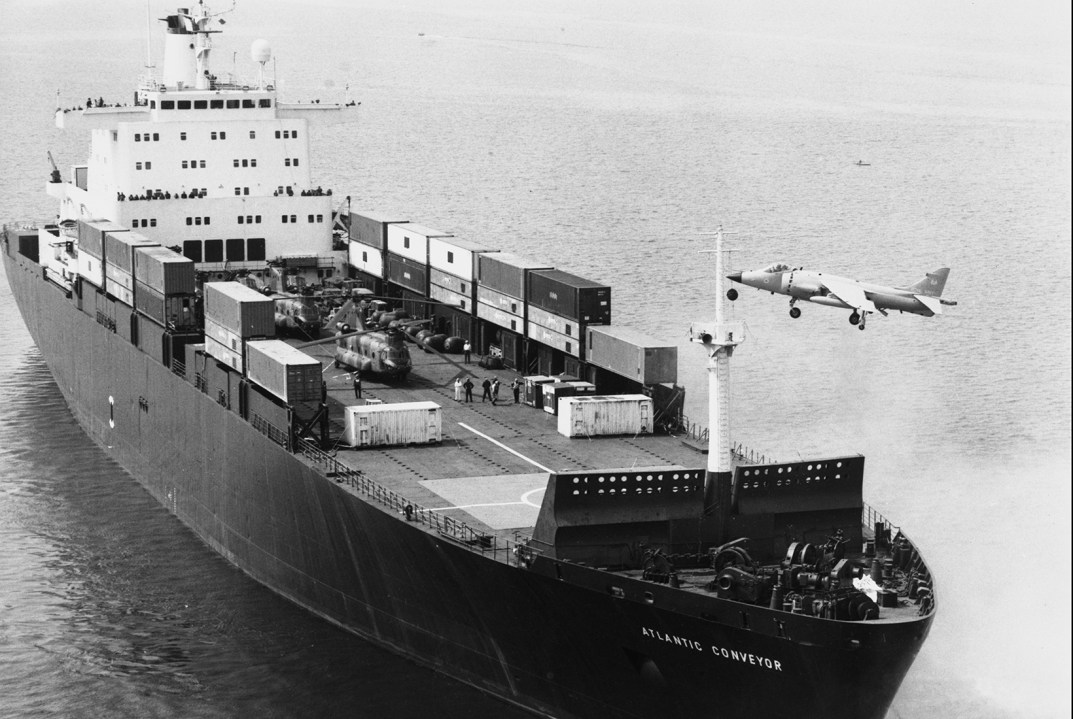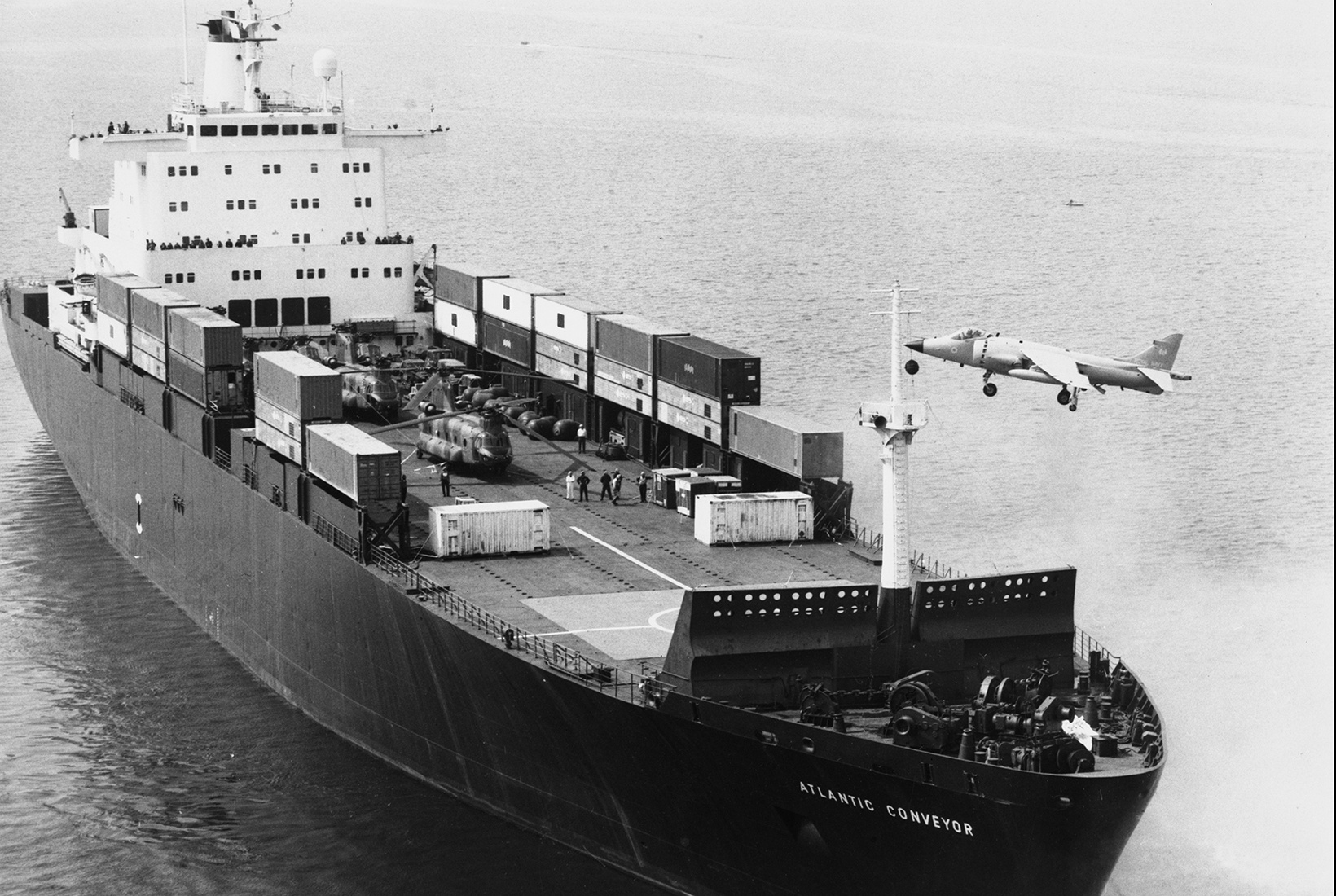‘The world,’ Mrs Thatcher was reported to have said, ‘is full of ships.’ With this comment, unlike in many other things, she lacked a common touch. I do not know what she thought about planes, still less jump jets, but no doubt she would have shared the sentiment of Rowland White’s Harrier 809 about their pilots: brave, selfless individuals who showed daring and ingenuity in overcoming the numerically superior Argentine air force to steal victory against the odds.
White is an aviation enthusiast, knowledgeable about the technical and logistical challenges fighter pilots face and adept at crafting a fast-paced narrative. His previous book, Vulcan 607, recounted the achievements of the V-bomber pilots who bombed the runway at Port Stanley, the Falkland Islands capital, a feat of nerves and engineering made possible by complex precision mid-air refuelling.
Harrier 809 focuses on Britain’s Sea Harriers, a story already told by Lieutenant Commander Nigel ‘Sharkey’ Ward, the commander of 801 Squadron. For Ward, bureaucratic infighting and senior commanders’ ignorance of the Harrier’s capability cost British lives. White’s book is perhaps partly a counterpoint. Ward, it seems, did not always get on with the more measured Lieutenant Commander Tim Gedge, the commander of 809 squadron, the unit around which most of White’s action revolves.
There is a somewhat Boy’s Own perspective of the Falklands War as a miniature Battle of Britain
The narrative is also panoramic. The first two parts of the book chronicle the hasty revival of 809 Naval Air Squadron to bolster the two squadrons already sent: the challenges in securing their place among the Task Force, of creating a leadership team, finding experienced pilots, conducting a small amount of necessary training, procuring equipment and sailing south. All this is told against a somewhat Boy’s Own perspective on the Falklands war as a miniature Battle of Britain.
In the final parts of the book, White’s narrative is gripping and hits home with hair-raising details of the dangers confronting the British Task Force. Two pilots went missing, assumed to have collided in mid-air in heavy fog. Another was never found after his jet exploded. A further pilot was taken prisoner. Another crashed after cluster bombing Goose Green before 2 Para’s attack, and evaded capture by running fast and hiding in a farmhouse. The pilots were men in their forties, often with wives and young children. They understood the sacrifice they might have to make.
White gives powerful accounts of Argentine breaches of the Task Force’s defences. Two Exocet missiles struck the Merchant Navy ship Atlantic Conveyor. The pilots who fired them perhaps believed they had locked on to one of Britain’s aircraft carriers. That was the real prize for the Argentine air force, as loss of one carrier could have jeopardised Britain’s war effort. Captain Ian North was the last to leave the stricken vessel. He did not survive the descent into the life rafts, claimed instead by the freezing South Atlantic, his body never recovered.
The historian in me would like to know how White accessed not just dialogue but also the thoughts of men under stress nearly 40 years ago. (‘You fool, he berated himself, as he flicked the Harrier into another hard turn to port.’) This is not a book that makes plain its source material: there are no footnotes or bibliography.
Rather, it is a military adventure, written with expertise, for those who share these passions. It is a tale of initiative, skill and courage, of pushing beyond the rules. It is not about dull and petty politics. The defence secretary John Nott — unpopular because the 1981 defence review proposed to cut the carrier HMS Invincible — apparently made ‘gonadal’ noises in discussion with a US counterpart about the durability of the fleet.
Nor is it really a book about taking hard choices, unlike some of the humbler memoirs written by senior military commanders. This war was fraught with difficult decisions, but for the men depicted here, the right path was often the one that might have appeared the most improbable. How to ensure British air defence would not shoot down their own Harriers? Ban the Harriers, naturally, from flying in an imaginary box above the landings. ‘I don’t give a damn about your bloody rules,’ Admiral Woodward is reported as saying. ‘This is how it is going to be done.’ How to protect the Sidewinder missiles from too many soakings? Dry them out in Invincible’s bread ovens and cover them in cling film, of course.
Harrier 809 is a story of masculine skill and daring, of technological prowess and of imagination — theirs, for the outlook to do what they did; and the author’s, to piece it together like this. The British armed services probably would not function in quite the same way without this under-acknowledged but un-hardheaded element: love of its machines, love of its men and love of its history.







Comments